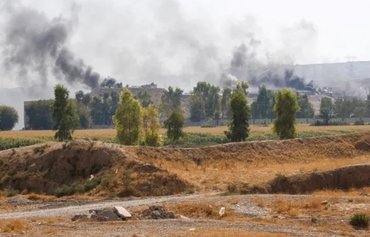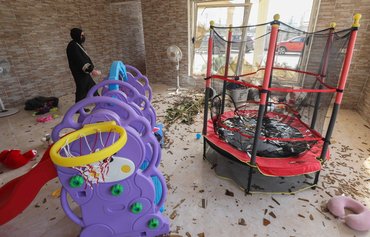ERBIL -- Iran launched new cross-border missile and drone strikes Monday (November 14) against Iraq-based Kurdish opposition groups it accuses of provoking "separatism and terrorist acts" in Iran.
Local officials said the strikes have killed at least one person.
The Islamic Revolutionary Guard Corps (IRGC) already launched attacks in late September that killed more than a dozen people in Iraq's autonomous Kurdish region.
Before Monday, the most recent attack happened on October 4, when the IRGC launched an artillery assault on a base of the Iranian Kurdish opposition party Komalah in the Kurdish region, party leader Abdullah Mohtadi told the New York Times at the time.
![Iran's attacks on Kurdish bases in Iraq has killed and wounded dozens of civilians since September. [Fars News]](/cnmi_di/images/2022/11/15/38731-Iran-attacks-Kurds-600_384.jpg)
Iran's attacks on Kurdish bases in Iraq has killed and wounded dozens of civilians since September. [Fars News]
Mohtadi said two people were injured in the shelling of the main base, about 16 km southwest of the city of Suleimaniyah.
In Monday's barrage, "five Iranian missiles targeted a building used by the Kurdistan Democratic Party of Iran", the mayor of Koysanjaq in the Kurdish region, Tariq al-Haidari, told AFP.
The region's health ministry said "one person is dead and eight were wounded. They are Iranian Kurds".
Plumes of black smoke billowed into the sky after the strikes, in videos shared on social media from the mountainous region.
Another "four drone strikes" targeted bases of the Iranian Communist Party and Komalah in the Zrgoiz region, said Atta Seqzi, a Komalah leader.
Violating Iraq's sovereignty
In Iran, Mohammad-Taghi Osanlu, an IRGC commander, confirmed the attacks. "We struck targets located along the border and 80 km from the border" with missiles and drones, he said.
Iraq's new Prime Minister Mohammed Shia al-Sudani, speaking in Baghdad, said that "we reject aggression from any country" and vowed that Iraq will "take all measures" in line with international law.
Iran's intermittent bombardment of northern Iraq's Kurdish region in recent months is not only a severe and alarming violation of Iraq's sovereignty but also is being seen as a tactic to divert attention from the turmoil inside Iran, observers say.
On September 26, the IRGC launched the largest offensive on Kurdish bases in northern Iraq in the past 10 years.
The assault killed 13 people -- including a pregnant woman -- and wounded a further 58, most of them civilians, including children under the age of 10, according to local forces in Iraq's Kurdish region.
Kurdish sources said the attacks comprised more than 70 bombardments carried out by "ballistic missiles" and "armed drones".
Attesting to the attacks on September 29, Brig. Gen. Mohammad Pakpour, commander of the IRGC ground forces, said the positions of "anti-Iranian terrorists" in northern Iraq were targeted "by the IRGC drone and missile units".
Reckless behaviour
The United Nations Mission in Iraq said in a tweet Monday that "we condemn renewed Iranian missile and drone attacks ... which violate Iraqi sovereignty".
"Iraq should not be used as an arena to settle scores and its territorial integrity must be respected. Dialogue between Iraq and Iran over mutual security concerns is the only way forward."
The United States also strongly condemned the attacks and called on Iran to "refrain from further threats against Iraq's territorial integrity".
The cross-border strikes in September saw Iraq's federal government in Baghdad call in the Iranian ambassador.
The UN mission at the time warned that such "rocket diplomacy is a reckless act with devastating consequences".

![The IRGC has repeatedly attacked the bases of Kurdish parties in Iraq over the past few months. [Fars News]](/cnmi_di/images/2022/11/15/38730-Iran-Iraq-Kurds-600_384.jpg)





